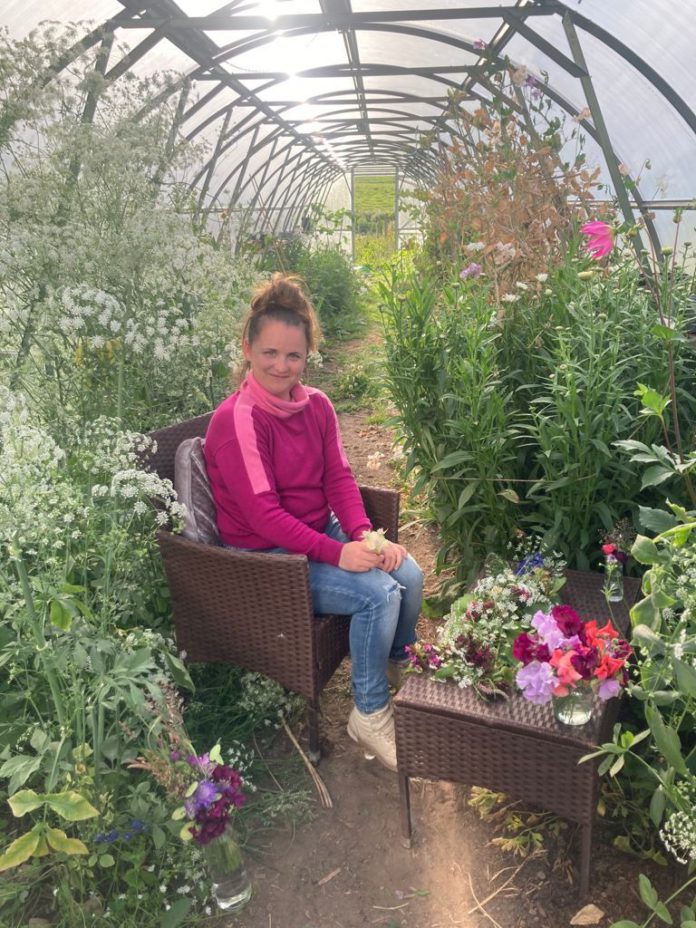In this week’s Farmer Focus segment, That’s Farming, speaks to Ali Franks of Clonakenny Flower Farm. The flower farmer discusses ditching cheffing for a new enterprise because of the Covid-19 pandemic.
The global Covid-19 pandemic gave Ali Franks the push to “jump at the notion of establishing a business that works around three little kids, endless animals and household bits and bobs”.
Ali worked as head chef in Cloughjordan House and was on maternity leave with her third child when the wedding venue temporarily closed its doors.
Having purchased three polytunnels the years previous, with her husband, Kenny, she decided to set up a bespoke florist and flower farm.
Clonakenny Flower Farm
The 36-year-old, who hails from Kildare and now resides in Clonakenny, Co Tipperary, told That’s Farming:
“I always had an interest in growing vegetables and flowers, having grown up with this at home. My mam always had vegetables in the garden and worked part-time as a florist.”
“I did always intend on establishing a flower farm, but it was a difficult decision to leave a steady job which I really enjoyed. However, the timing of Covid and periods of lockdown made me realise that the perfect timing did not exist, and I needed to plough on with the idea of having my own business.
“We began in June 2020. Like anything in life, you need to be passionate about what you do, especially when setting up your own business.”
She completed many courses through the Tipperary Enterprise Office and spoke to flower farmers about the business.
The 3-acre holding strives to provide home-grown Irish flowers to the Irish public. They farm using sustainable methods, with as little disruption to nature as possible.
Site, soil and training
Their site is exposed to wind, so for them, polytunnels are essential to ensure that flowers are kept “upright” and in “perfect condition”.
“The soil here is very good for growing, having previously been used for grazing. Therefore, we did not need to try and add to the soil to make it in prime condition for growing flowers.”
“A knowledge of flowers and also a network of people with years of experience has proven an invaluable resource.”
“Our flowers are natural, colourful and scented. They reflect flowers grown in the Irish countryside and change season by season.”
Ali completed a start your own business course, accounting course and the ACORNS 6 programme for rural start-up businesses.
She also experimented extensively with growing methods, formulating natural tonic feeds, soil maintenance etc.
“On the creative side, I worked with many different floristry techniques to perfect the natural, airy look that our flowers lend themselves to.”
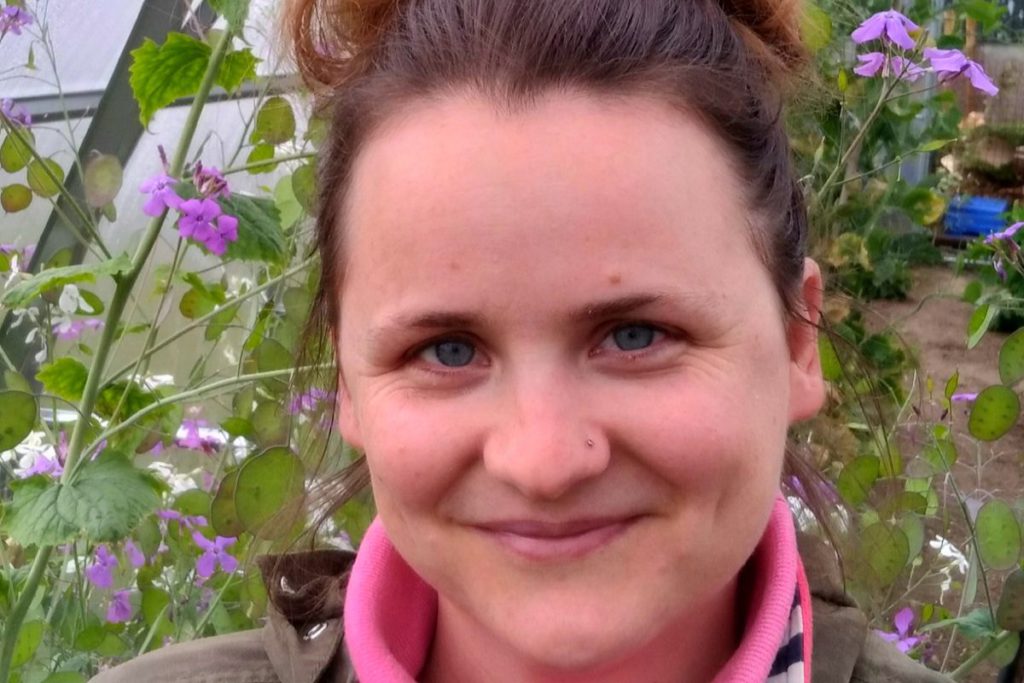
Flower farming – the process
They grow a large range of flowers depending on the time of year. In September, they have dahlias, cosmos, statice, strawberries, lavender, cornflowers, sweet pea, etc.
They grow flowers from seed, stored wintered bulbs, seed saving and taking snips. “This is a very economical way to maintain high yields of flowers. The drawback would be the time factor.”
“In September, we are busy tidying outside beds for winter, trying to retain heat in the tunnels to continue producing flowers, planning bulbs next year.”
“We take this time to mulch all beds and feed with tonic to help them over the winter. We work from the outside beds first. Then, when the weather changes and gets more turbulent, we can be in the polytunnels working away, knowing that outside is bedded down for the winter months.”
“Furthermore, we started by selling bouquets at our gate to being a wedding flower supplier in the space of six months which was an exceptional turnaround for a small business like ours.”
“We are currently very busy with wedding flowers and have bookings taken for the next two years. In writing that, I have only just taken stock of that now!”
“This, I suppose, shows that sometimes you are very busy with the next thing, the next thing etc., that you do not take the time to see what you have already achieved.”
Customer base and workshop/shop
They supply flowers – bouquets, wreaths, etc. – locally and cater for wedding flowers on a case-by-case basis.
“Currently, most of our couples live in Tipperary, but we are open to all enquiries nationwide,” the flower farmer added.
They grow flowers on the farm from February through to October/November. After that, they use their own dried flowers and foraged foliage, berries, twigs, dried wheat, and dried flowers in December.
Besides, they have a large farm shed to the back of their home which they are converting into a workshop/shop.
“This will be a game-changer for us. I am currently working from a small room in the house. Having more space and somewhere to bring couples for consultations will be fantastic.”
“I think flowers are universal. So, we do not have an exact target market. We want to showcase our flowers to all ages and gender.”
“I suppose logistically and financially, weddings would be the area we would like to grow. It is our local bread and butter that gives us just as much enjoyment, and we have been blessed to have such fabulous community support.”
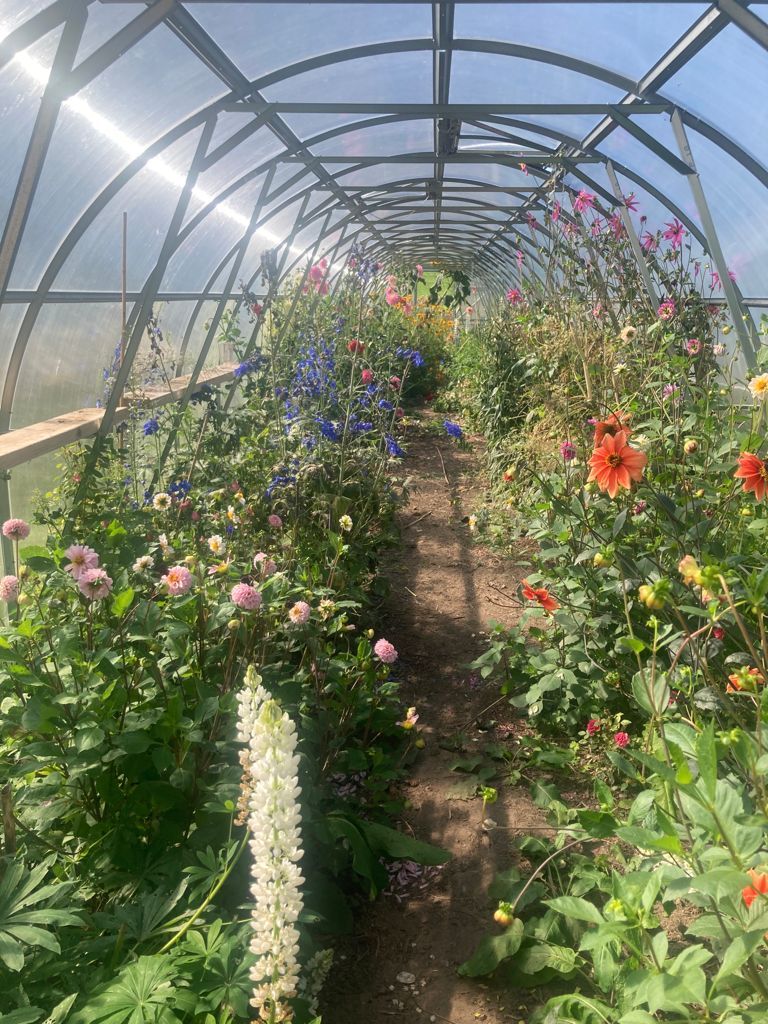
Challenges the flower farmer faced
For Ali, the biggest challenge she faced was “trying to juggle everything” – achieving a work-life balance.
“When working as a chef, I was gone from the house and returned after my shift. When I work at home, I find myself outside, then in making dinner, emailing, then changing nappies….it is all a bit chaotic.”
So, now she has structured her day so that she can focus time on outdoor tasks, then household jobs, then homework etc. She has set times for admin, returning calls/emails, for example.
ACORNS
She also struggled with having the confidence to set up her own business, having always worked for someone else. This is where the ACORNS programme helped her the most.
She was assigned a mentor and group, and together, they worked on all aspects of their businesses.
“It was like having a board of directors with you. We had great honest chats and practical advice sessions. I was blessed to be accepted onto this programme, and I know I have a support network available whenever I need it.”
“ACORNS helped me on a professional and personal level to realise my dreams of having my own business.”
“The modules covered were completely relevant to a start-up business, and the workshops were excellent. Furthermore, the support was incredible.”
“ACORNS 6 took place during lockdown, a time we were shut off from one another and shut off from our usual avenues of support. ACORNS 6 became that support and will continue to provide support in years to come.”
Call for 2021 applicants
The Department of Agriculture, Food and the Marine has issued a call for applicants for ACORNS 7. ACORNS is funded under the department’s Rural Innovation and Development Fund.
The free initiative will run over six months from October 2021 to April 2022, with the deadline for applications at midnight on September 10th, 2021, as reported by That’s Farming.
There is no charge for those participating in ACORNS due to the DAFM’s support and the voluntary contribution of time by the lead entrepreneurs.
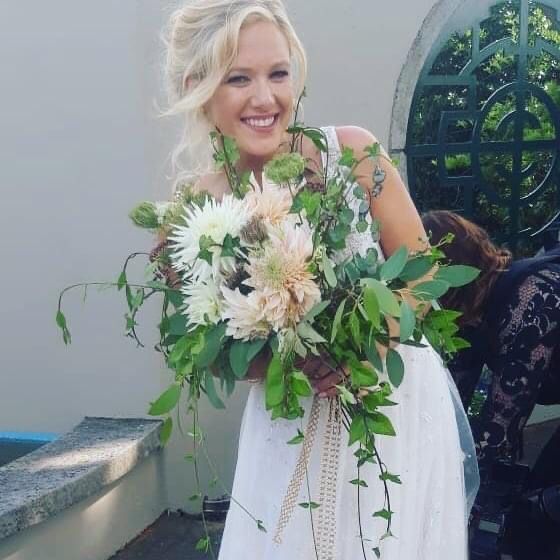
Seasonality, grants, and infrastructure
Ali cited the seasonality of flowers in Ireland as a challenge in this field. Flowers are thin on the ground in December, January and into February.
“Like sheep having lambs in spring, we need to drive the message that if you want Irish flowers in winter, it will be dried flowers, foliage, berries etc., which are stunning and would be prized possessions in other climates.”
Also, as flower farming falls between agriculture and horticulture, it was “very difficult” for her to secure funding or grants.
“So, we had to do we spend a few years saving to have the infrastructure needed to make the business viable.”
“Maybe a nationwide campaign on the day-to-day running of a flower farm will show how similar it is to agricultural methods. Also, it would be good to show how many flowers we can grow here in Ireland and how perfect our soil is for this.”
“It is an area of farming that is new. As with anything new, it is up to the flower farmers to include the Irish public in what we are doing and show the benefits of supporting Irish flower farmers.”
Satisfaction
However, these negatives outweigh several positives for the flower farmer.
“I love being outside with my hands in the soil, kids running around me, and the radio on. Honestly, I enjoy every aspect of flower farming.”
“I especially love harvesting flowers for a couple’s wedding knowing we have grown them from seed, minded them for months and then arranging them for a couple’s big day. There is nothing like the process of growing flowers, the sense of satisfaction and pride from start to finish.
“I enjoy being my own boss, working hours that suit our family, making decisions and planning ahead. I enjoy the freedom of creating floral arrangements using my own style of flower arranging and not having to follow any rules,” she added.
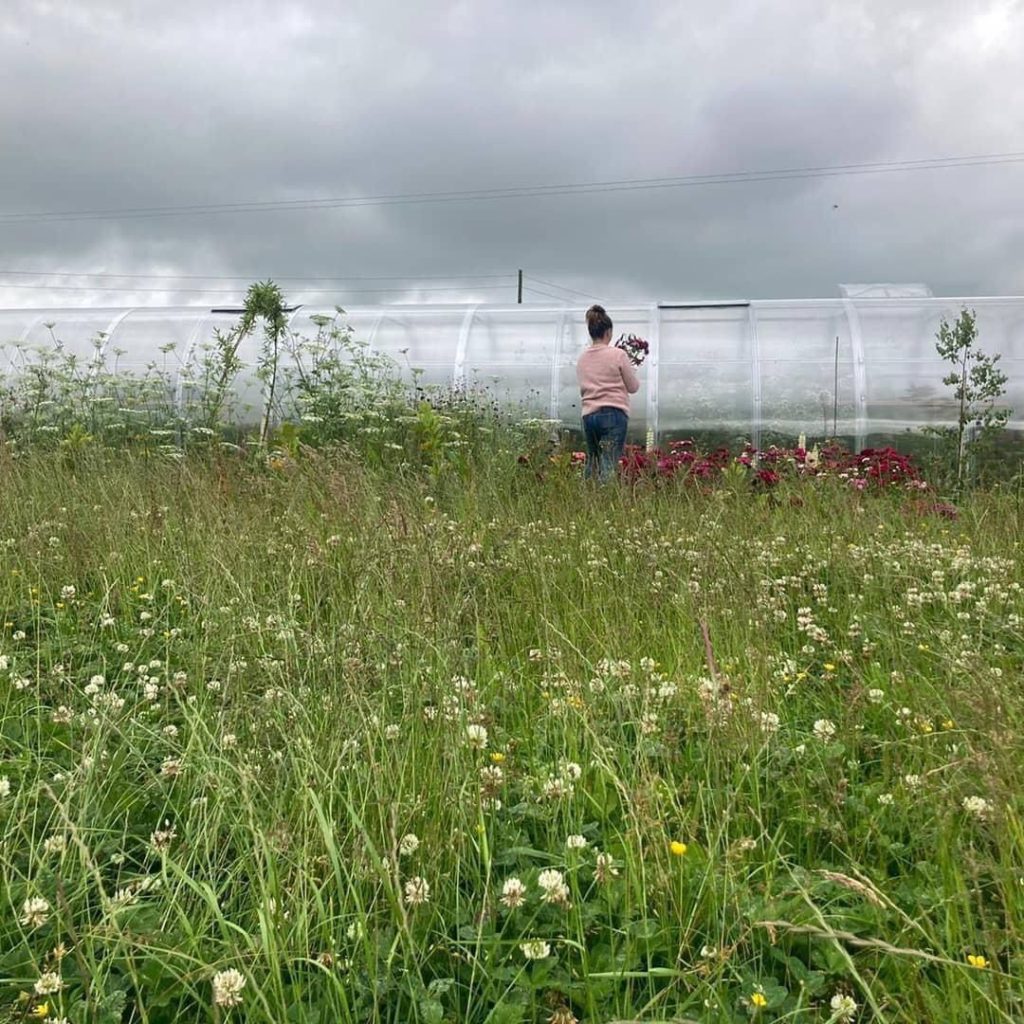
Success
Ali has achieved a lot in a short time, something that she is grateful for that.
“I also believe that if you make or do anything with the love for it that you will succeed. You can always tell when someone has put love and care into something, and that is my number one idea of what a successful business should reflect.”
“My brain is always buzzing with ideas, so it is hard to detangle them. At the minute, our plans would be to continue converting our shed, build up a strong wedding portfolio for next year and to plan the planting for next year.”
“In the long-term, I would love to have a little shop on-site where I could pick the day’s harvest and arrange for people to collect.”
“I do not want to go down the root of mass-producing flowers and throwing myself into a million and one things.”
She said she has based her business on the love of flowers and the love of her family. Therefore, she has a desire to “keep the balance of that right”.
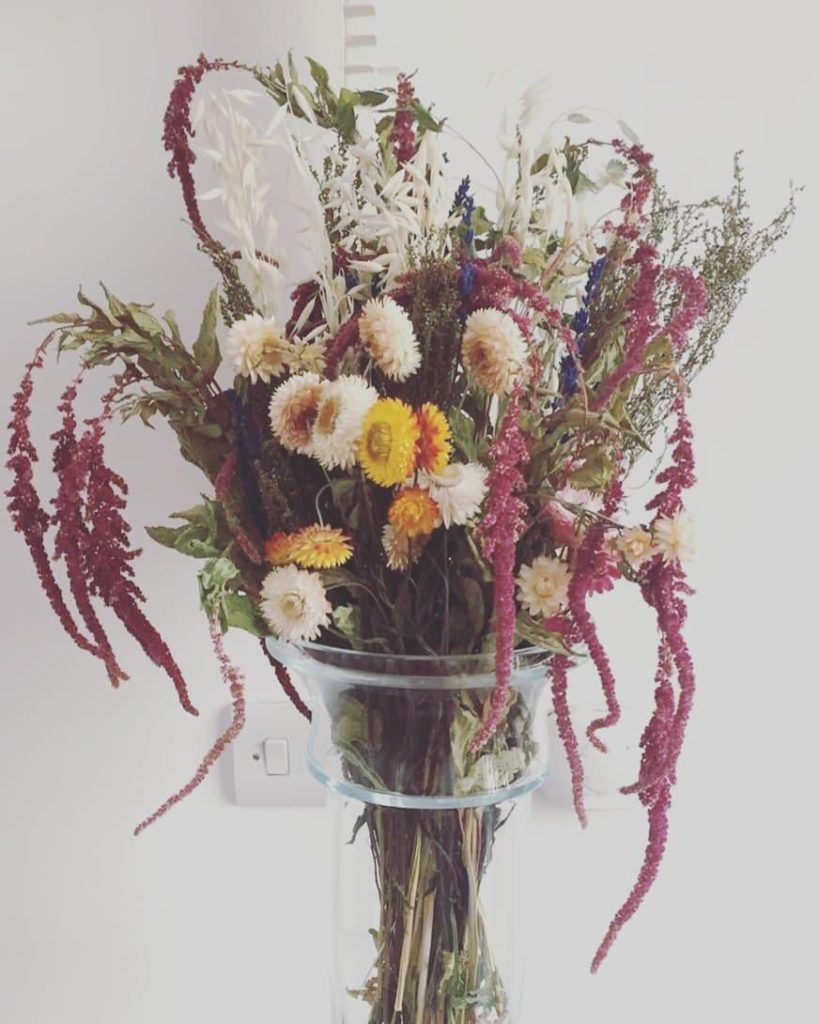
Cheffing: long hours and pressure
“I want to be able to work at something I love while being able to bring my kids hurling and have some time to sit and have a meal together.”
“So, I think I would say that my long-term plans are to let the business grow organically, and through trial and error, we will see what works best.”
“I see this business as my job now. I enjoyed every minute of being a chef and had some amazing experiences for which I am very grateful.”
“But for me, the long hours and levels of pressure just did not fit in with having a young family to raise. And trust me, cooking for this family is a full-time job in itself,” she laughed.
“My goal is to live a happy life surrounded by people I love. There is no other goal I see as being more important than that.”
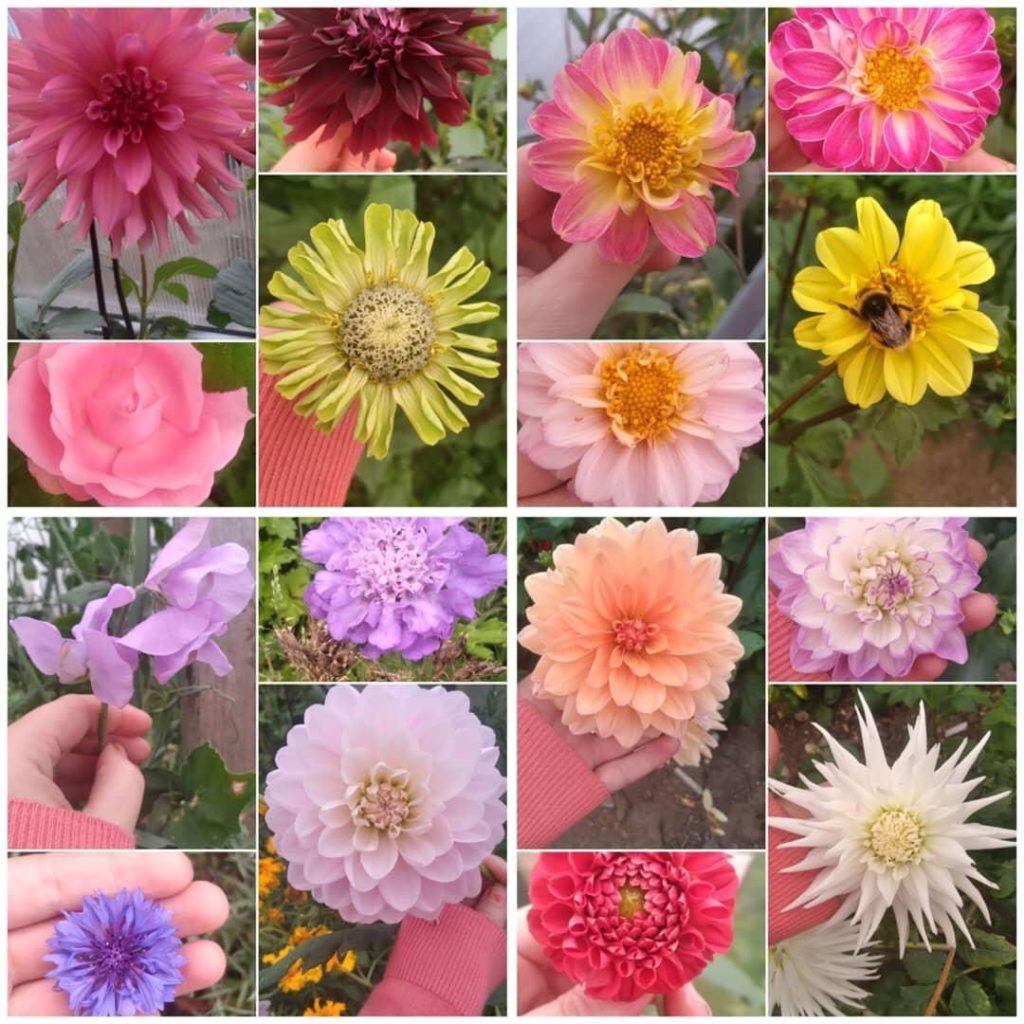
Flower farming in Ireland
Flower farming in Ireland, in a nutshell, is a viable business. There are good profit margins to be made from growing your own flowers and arranging them. The overheads, once you have the infrastructure in place, are not huge.”
“It is labour and time-intensive, and that is the biggest consideration of all. And like with any enterprise, you have to be willing to work hard and say yes to new opportunities or all opportunities.”
“We have a climate that is kind to flowers, for the most part, and excellent soil, again in the most part. So, there is a lot in favour of this type of farming.”
Ali believes a growing number of flower farmers are running these farms in conjunction with traditional farming such as dairy, tillage, etc.
She said the Irish public is asking more questions about where their products come from and seeing the benefit of supporting Irish businesses and, therefore, supporting Irish families.
“I do think this is an area with the potential for huge growth, and I feel that it would be incredibly beneficial to have more discussion with government bodies on the benefits flower farms have to the promotion of the green economy.”
“The journey has been exciting and rewarding. I know I have found the thing in life that I will never stop learning from, that I am closest to nature when I am doing, and something that expresses my creativity,” she concluded.
To share your story like this flower farmer, email – [email protected]
Read more success stories from ACORNS participants.


